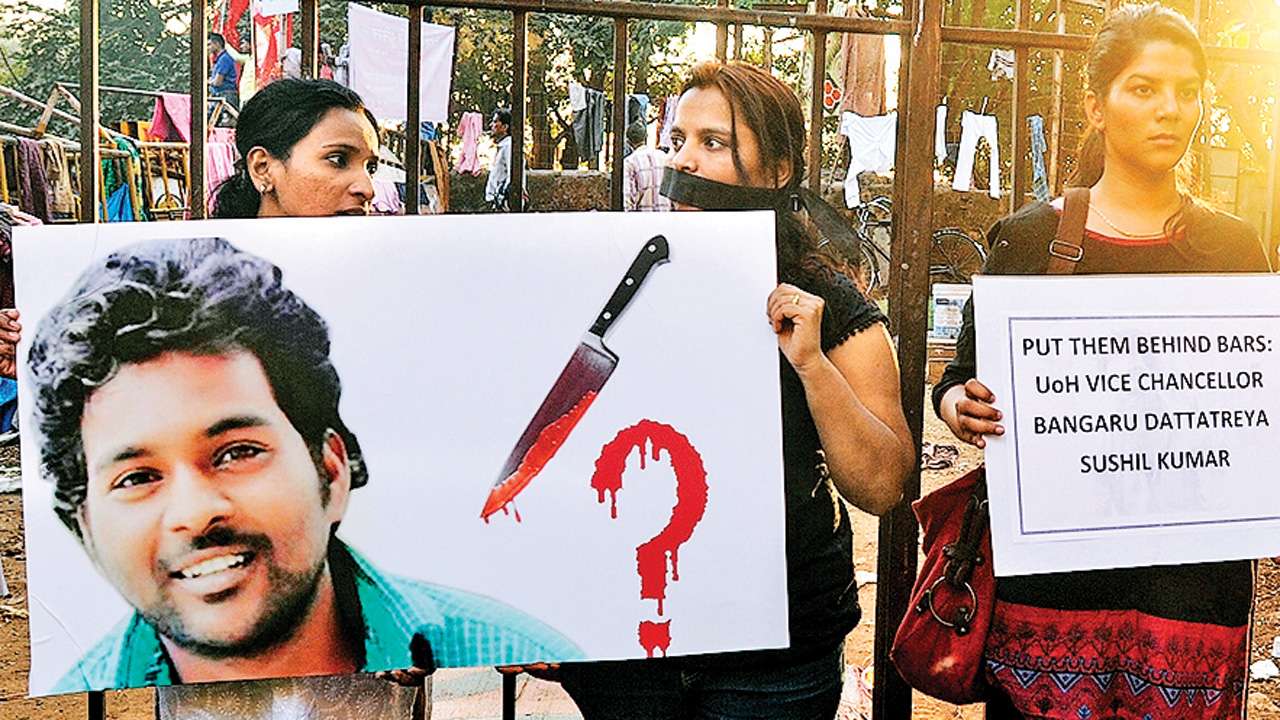Supreme Court seeks Centre's response on casteism in campus
According to the petitioners, there have been 20 other documented suicides of similar nature since 2004 that were not highlighted

File picture of a protest seeking justice for Rohit Vemula
WRITTEN BY
Abraham Thomas
SOURCE
DNA
Updated: Sep 21, 2019, 05:00 AM IST
The Supreme Court on Friday set out to examine how despite regulations being in place to check caste-based discrimination in central universities, persons belonging to the reserved communities felt victimised with some even being driven to the point of death.
Sharing this concern with the Court were two mothers – Abeda Salim Tadvi and Radhika Vemula – who lost their children to such discrimination – one her daughter, a resident doctor Payal Tadvi in May 2019 and the other her son Rohit Vemula in January 2016. Both incidents were documented cases of suicide due to discrimination.
According to the petitioners, there have been 20 other documented suicides of similar nature since 2004 that either could not be highlighted or failed to get noticed. It was only after the recent suicide of Payal Tadvi, the Government woke up. The University Grants Commission (UGC) shot a letter to all varsities reminding them of its UGC (Promotion of Equity in Higher Educational Institutions) Regulations 2012 aimed to eliminate all forms of discrimination by providing preventive and protective measures.
CASE FILE
According to the petitioners, there have been 20 other documented suicides of similar nature since 2004 that were not highlighted
It was only after the recent suicide of Payal Tadvi, the government woke up, say petitioners
The letter disclosed the fact that the Regulations required all colleges/universities to establish an Equal Opportunity Cell and appoint Anti-Discrimination Officer (ADO) to investigate complaints of any form of discrimination. Reminders were issued by UGC to all colleges from time to time on July 2011, July 2013, March 2016, September 2016, May 2017, June 2018 and latest in June 2019 seeking compliance of the Regulations.
The petition said, "The non-implementation of the UGC Regulations has resulted from lack of accountability on part of the university or college administration. The repeated inaction by state functionaries is resulting in an increasing number of student suicides and thus is violative of right to life under Article 21."
The bench of Justices NV Ramana and Ajay Rastogi felt that the matter required consideration and issued notice on the petition to the Union Ministry of Human Resources Development, UGC and the National Assessment and Accreditation
Senior Counsel Indira Jaising, arguing for the petitioners, highlighted that there are 288 central universities and an equal number of deemed varsities. An RTI seeking details of compliance by Universities on the UGC's Equity Regulations for the year 2017-18 revealed that only 419 universities out of around 880 recognised universities had replied to UGC. The UGC has till date failed to take any action against those universities which failed to comply, the petition stated.
In the instances highlighted by the petition, in 2007 a PhD student Senthil Kumar committed suicide due to alleged discrimination at the University of Hyderabad. This was the same place where nine years later, Rohit Vemula too ended his life after he was suspended from the college for alleged anti-national activities. He was a member of the Ambedkar Students Union. In November 2013, a PhD student Madari Venkatesh consumed poison and ended life in a college in Hyderabad. On enquiry, it was revealed that he was not allotted a PhD guide for his doctoral studies. Another instance of discrimination surfaced in January 2018 when a faculty member of IIT Kanpur complained of discrimination by his colleagues which were found true on enquiry. The suicide of Payal Tadvi then followed at a Mumbai colleague where she suffered discrimination due to her Adivasi identity.
Supreme Court
Mumbai
campus